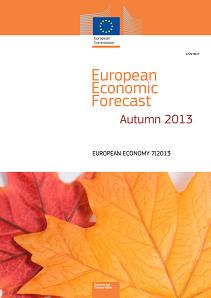Rogoff, K., (2013), “Why Wealth Taxes Are Not Enough”, Project Syndicate, 04 Νοεμβρίου. Should advanced countries implement wealth taxes as a means of stabilizing and reducing public debt over the medium term? The normally conservative International Monetary Fund has given the idea surprisingly emphatic support. The IMF calculates that a one-time 10% wealth levy, if introduced quickly and unexpectedly, could return many European countries to pre-crisis public debt/GDP ratios. It …Read More
The European Banking Disunion
Gros, D., (2013), “The European Banking Disunion”, Project Syndicate, 06 Νοεμβρίου. The purpose of the euro was to create fully integrated financial markets; but, since the start of the global financial crisis in 2008, markets have been renationalizing. So the future of the eurozone depends crucially on whether that trend continues or Europe’s financial markets become fully integrated. But either outcome would be preferable to something in between – neither …Read More
Easing now or later? – That’s the ECB’s question
De Sousa, C., (2013), “Easing now or later? – That’s the ECB’s question”, Bruegel, 06 Νοεμβρίου. October euro area annual overall inflation is expected to be 0.7% (the lowest in 47 months and down for the fourth consecutive month), while core inflation (excluding energy, food, alcohol and tobacco) is estimated at 0.8%; down from 1.1% and 1.0% in September respectively, according to a flash estimate from Eurostat This is below …Read More
Sovereign Risk and Belief-Driven Fluctuations in the Euro Area
Corsetti, G., Kuester, K., Meier, A. and Müller, G., (2013), “Sovereign Risk and Belief-Driven Fluctuations in the Euro Area”, International Monetary Fund, IMF Working Paper, WP/13/227. Sovereign risk premia in several euro area countries have risen markedly since 2008, driving up credit spreads in the private sector as well. We propose a New Keynesian model of a two-region monetary union that accounts for this “sovereign risk channel.” The model is …Read More
The deflationary bias of Germany’s current account
Cohen-Setton, J., (2013), “Blogs review: The deflationary bias of Germany’s current account”, Bruegel, 06 Νοεμβρίου. For the first time the U.S. Treasury semi-annual report to “Congress on International Economic and Exchange Rate Policies” blamed Germany explicitly for its continuous current account surpluses, which have resulted into “a deflationary bias for the euro area, as well as for the world economy.” The response of the German finance ministry that Germany’s current …Read More
Europe’s Non-Rhetorical Values
Balcerowicz, L., (2013), “Europe’s Non-Rhetorical Values”, Project Syndicate, 05 Νοεμβρίου. The debate about Europe’s future is burdened by misleading and emotionally charged rhetoric, with vague talk of “more Europe” hampering productive discussion about European countries’ real problems. Indeed, beyond the loaded language lie fundamental questions that have yet to be answered convincingly. What exactly would “a federal Europe” entail? Is “European solidarity” a euphemism for the transfer union that Germany …Read More
European Economic Forecast – Autumn 2013
European Commission, (2013), European Economic Forecast – Autumn 2013, Brussels: European Commission. The EU economy has returned to positive GDP growth. Following a slow and still vulnerable expansion of economic activity during the remainder of 2013, growth is set to become gradually more domestic demand-driven and more robust in the course of 2014 and into 2015. The legacy of the crisis-deleveraging, financial fragmentation, elevated uncertainty and rebalancing needs – will …Read More
Human Life? 2013 – Measuring Well-Being
OECD, (2013), Human Life? 2013 – Measuring Well-Being, Paris: OECD. Every person aspires to a good life. But what does “a good or a better life” mean? The second edition of How’s Life? paints a comprehensive picture of well-being in OECD countries and other major economies, by looking at people’s material living conditions and quality of life across the population. In addition, the report contains in-depth studies of four key …Read More
The Cypriot Economic Collapse
Pegasiou, A., (2013), “The Cypriot Economic Collapse: More Than a Conventional South European Failure”, Mediterranean Politics, Volume 18, Issue 3, pp. 333-351. In trying to assess the causes behind Cyprus’s request for a financial bailout, the paper takes a step back and reviews the economy of the island within a comparative political economy framework. With reference made to varieties of capitalism (VoC) literature, the paper sets a twofold target. Initially, …Read More
EU 2013 Report on Policy Coherence for Development
European Commission, (2013), “EU 2013 Report on Policy Coherence for Development”, Commission Staff Working Document, SWD(2013) 456, Οκτώβριος. Τhe European Commission published its report on policy coherence for development which lays out the progress made by the EU and its Member States in ensuring that their action in areas such as trade, agriculture, security or migration is in line with the goal of overcoming poverty in developing countries. The report …Read More






